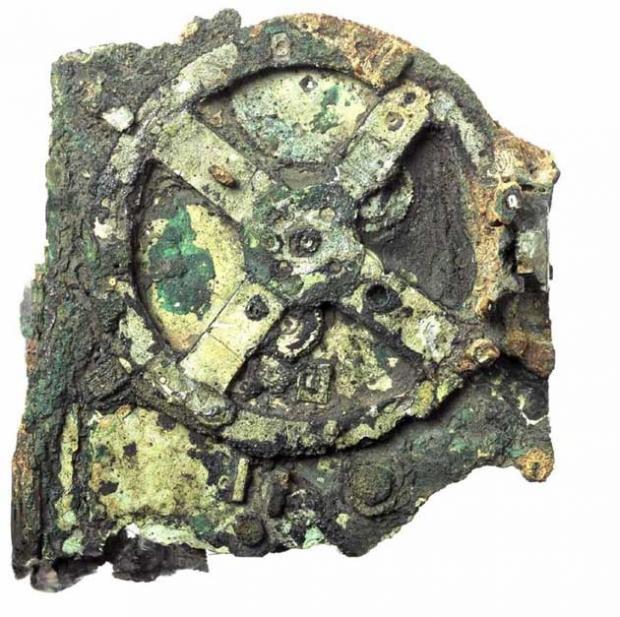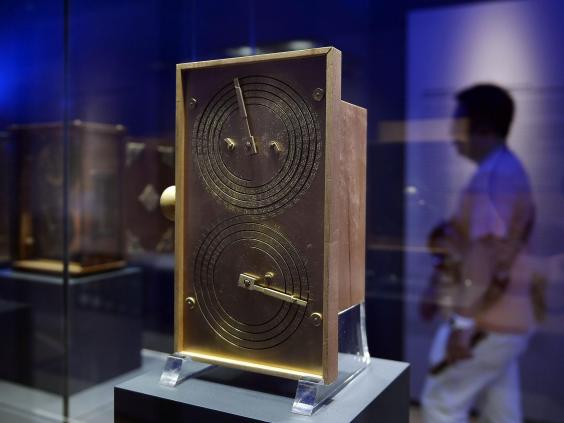
Today's Google Doodle marks the 115th anniversary of the unearthing of the Antikythera Mechanism, a device used by the Ancient Greeks to chart the progress of the planets across the zodiac.
The relic is often described as the world’s first computer and has a fascinating history.
The Antikythera Mechanism, the subject of today’s Doodle, is a 2,000-year-old astronomical instrument
The contraption would have been employed by early astronomers to mark the calendar and anticipate solar and lunar eclipses by following the movement of the sun, moon and planets.
It was also used to plot the four-year cycle for scheduling athletics tournaments similar to the Olympic Games.
A complex piece of machinery, the mechanism consists of 30 meshing components and dials and is housed inside a box of wood and bronze.
It is thought to have been assembled on the island of Rhodes as long ago as 150 BC, possibly with contributions from the great Greek astronomer Hipparchus.
It was retrieved from the bottom of the Aegean Sea 115 years ago today
The mechanism was discovered by Greek archaeologist Valerios Stais on 17 May 1902 when he dived down to inspect the wreck of a Roman cargo ship off the coast of the island of Antikythera - the boat thought to have been ferrying treasures to Rome in time for a triumphal parade staged by Julius Caesar.
Sponge divers had spotted the remains of the ship lying on the ocean floor two years earlier and already rescued a number of artefacts from its hull, including bronze and marble statues, coins, jewellery and pottery.
Stais found a hunk of corroded metal and wood resembling an antique gear or crank, which would turn out to be one of the archaeological finds of the century.
The true purpose of the device was only discovered in 1959
Originally assumed to be an ancestor of the astrolabe, it was Princeton science historian Derek J. de Solla Price who uncovered the true purpose of the Antikythera Mechanism.
Price became interested in the machine in 1951 and took extensive X-ray and gamma-ray images of its 82 fragments with the aid of Greek nuclear physicist Charalampos Karakalos.
Having completed his detailed study, Price realised that its main gear was intended to represent the calendar year while its smaller, separate gears stood for the celestial bodies.
Price worked on the device for 23 years and published extensive findings in 1974, telling Scientific American: “The mechanism is like a great astronomical clock... or like a modern analogue computer which uses mechanical parts to save tedious calculation.”
It is a precursor to the modern computer
As Price observed, although the rusting remnants of the Antikythera Mechanism bear little resemblance to current laptops or tablets, its importance lies in its use as a calculator, allowing antiquity’s astronomers to carry out detailed arithmetic based on the planets.
Primitive though it may appear to contemporary eyes, the technology was fantastically advanced for its period and mechanical devices of the same degree of sophistication would not be seen again until the advent of clockwork in mediaeval Europe.
Since Price’s breakthrough, further advances have helped scientists clarify the nature of the machine. In 2000, 3D mapping revealed inscriptions that effectively serve as an instruction manual giving guidance on its use.
The Antikythera Mechanism is currently on display in Athens
The remnants of this extraordinary find are currently on display in the National Archaeological Museum in the Greek capital, where visitors can try out a replica to get a better understanding of its workings.









